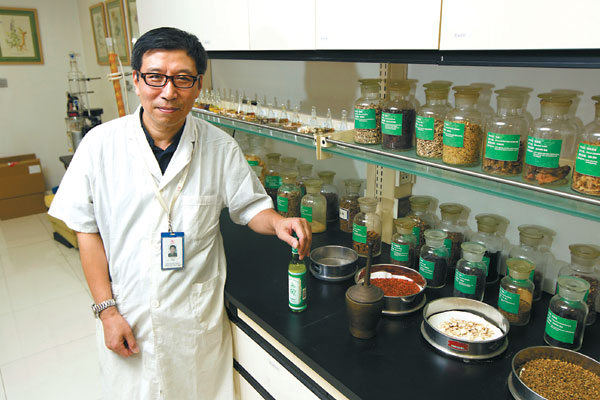
 |
|
Li Huiliang says work on Liushen Floral Water will continue, as climate changes and mosquitoes evolve. Gao Erqiang / China Daily |
Because of him, a few generations of women, and some men, have walked out in summer sweetly scented and safe from the attention of unwelcome bugs and pests.
But for Li Huiliang, 55, his re-invention of floral dew, the herbal-scented, flower powered tonic that comes bottled in the familiar green glass bottle is all about science, a very rigorous science.
The basis of that science, says the cosmetologist, is the battle between humans and a tiny mosquito.
"There is not a single step to be missed," he says when we met in his laboratory, where the "father of Chinese cosmetics" spends most of his waking moments.
As the inventor of Liushen Floral Water, Li, a Shanghai native, prefers to think of it as "a perfumed medicine" that can "repel insects and relieve itching".
To him, the work continues, and will go on, as the formula needs to be improved all the time because "people's skin changes, the climate changes, the environment changes and the mosquitoes change."
The manufacturing process has to be scrupulously accurate, and "we may have the world's most complicated perfume manufacturing process, with more than 1,000 procedures, because when you are selling at such large volumes,, you need to be meticulous," Li says.
It is estimated that about 1.5 billion bottles of floral water has been sold since it reached the market.
That is also why Li spends most of his time still in the lab, experimenting with all sorts of herbs collected from all over China.
The story began in the summer of 1988, when Li and four other colleagues received the assignment from their bosses to produce a product that is "sweet-smelling and would ease prickly heat rashes" to meet market demands.
Air-conditioning was rare then, and in the summer, prickly heat rashes became a common complaint for both adults and children.
It took almost three years for the pharmacology graduate and his team "to create something out of nothing".
They even had to invent the machine to distill the essence out of the ingredients, mostly curative herbs with traditional medicine healing properties.
"We mainly borrowed from Huangdi Neijing, the Inner Canon of the Yellow Emperor. It is a traditional pharmacological text that first advocated the use of alcohol as medicine.
"But apart from that, we had nothing physical to refer to."
Finally, in the summer of 1992, when Liushen Floral Water hit the market in grocery shops all over the country, it sold like hotcakes.
There were few large-scale supermarkets then, but the sales volumes were still amazing, and the company was caught by surprise.
"It was so unexpected. Long lines of trucks waited outside the factory to be loaded up and then they would fan out all over the country.
"We had prepared a first quota of 50,000 bottles.
"In the end, we sold off 1 million bottles," Li remembers with pride.
The competition from domestic and imported products is now more intense than ever, and the younger Chinese have now shifted their allegiance and cash from the floral water of their childhood to the more novel imported perfumes.
But Li is confident Liushen Floral Water will withstand the onslaught of competition and that it is not time to retire the product into the cosmetic archives.
"People may get less prickly heat or rashes these days, but as long as the little mosquitoes are still buzzing around, there will always be a place for our product on the shelves."
Contact the writer at [email protected].